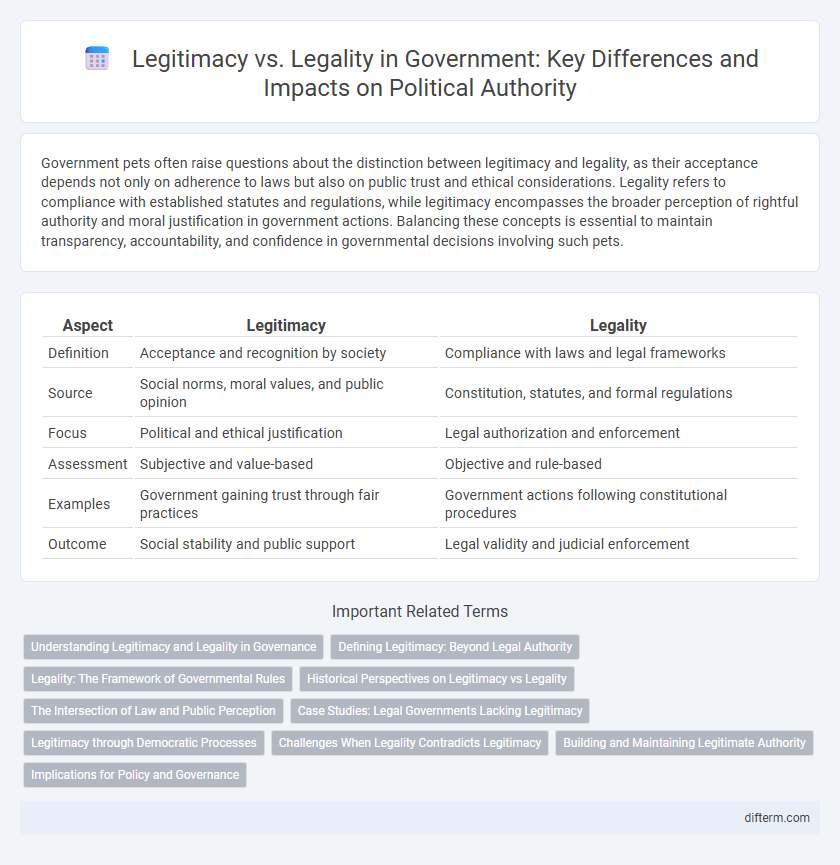Government pets often raise questions about the distinction between legitimacy and legality, as their acceptance depends not only on adherence to laws but also on public trust and ethical considerations. Legality refers to compliance with established statutes and regulations, while legitimacy encompasses the broader perception of rightful authority and moral justification in government actions. Balancing these concepts is essential to maintain transparency, accountability, and confidence in governmental decisions involving such pets.
Table of Comparison
| Aspect | Legitimacy | Legality |
|---|---|---|
| Definition | Acceptance and recognition by society | Compliance with laws and legal frameworks |
| Source | Social norms, moral values, and public opinion | Constitution, statutes, and formal regulations |
| Focus | Political and ethical justification | Legal authorization and enforcement |
| Assessment | Subjective and value-based | Objective and rule-based |
| Examples | Government gaining trust through fair practices | Government actions following constitutional procedures |
| Outcome | Social stability and public support | Legal validity and judicial enforcement |
Understanding Legitimacy and Legality in Governance
Legitimacy in governance refers to the public's perception of a government's rightful authority based on shared values, trust, and moral acceptance, while legality pertains to the government's actions being in accordance with established laws and constitutional frameworks. Effective governance requires both legitimacy, which secures citizen compliance and social stability, and legality, which ensures actions are legally justified and accountable to rule of law principles. Governments lacking legitimacy may face civil unrest despite legal authority, highlighting the essential balance for sustainable political order.
Defining Legitimacy: Beyond Legal Authority
Legitimacy transcends mere legal authority by encompassing the moral and social acceptance of government power by its citizens. It involves the perception that political institutions and actions are rightful, just, and aligned with societal values, which often influences compliance and stability more than legal mandates alone. In democratic governance, legitimacy is reinforced through transparency, accountability, and participatory processes that foster trust beyond formal legality.
Legality: The Framework of Governmental Rules
Legality defines the framework of governmental rules by establishing the formal codes, statutes, and regulations that govern state actions and public policies. It ensures that all governmental operations comply with constitutional mandates and statutory requirements, providing a clear legal basis for authority and accountability. The principle of legality mandates that no government action can be deemed valid unless grounded in law, reinforcing the rule of law in democratic governance.
Historical Perspectives on Legitimacy vs Legality
Historical perspectives on legitimacy versus legality reveal tensions between moral authority and codified laws throughout governance evolution. Classical political theorists like Max Weber distinguished legitimacy as the recognition of rightful authority, while legality pertains strictly to adherence to formal rules. Revolutionary movements frequently challenged existing legal frameworks when perceived legitimacy deteriorated, highlighting the fluid interplay between societal consent and statutory governance.
The Intersection of Law and Public Perception
Legitimacy in government hinges on public perception and acceptance of authority, which often extends beyond strict legality rooted in written laws and statutes. The intersection of law and public perception shapes the durability and effectiveness of governance, as legal frameworks may lack influence without societal approval. Understanding this dynamic is crucial for policymakers to balance judicial mandates with evolving public norms and values.
Case Studies: Legal Governments Lacking Legitimacy
Numerous case studies demonstrate that governments can maintain legal authority yet lack popular legitimacy, such as Venezuela under Nicolas Maduro, where electoral processes faced international scrutiny despite constitutional compliance. Zimbabwe's Robert Mugabe regime also exemplifies this dichotomy, legally in power but widely perceived as illegitimate due to electoral fraud and human rights abuses. These examples highlight the critical distinction between legality, grounded in law, and legitimacy, rooted in public acceptance and moral authority.
Legitimacy through Democratic Processes
Legitimacy through democratic processes is fundamental for governments to gain public trust and authority, grounding their power in the consent of the governed. Unlike legality, which strictly involves adherence to laws and regulations, democratic legitimacy emphasizes transparency, accountability, and active citizen participation in decision-making. This process ensures that government actions reflect the collective will, fostering social stability and reinforcing institutional credibility.
Challenges When Legality Contradicts Legitimacy
Challenges arise when legality conflicts with legitimacy, undermining public trust and government authority. Legal statutes may be strictly followed, yet lack moral or popular support, leading to civil unrest and governance crises. Resolving this tension requires balancing adherence to the rule of law with responsiveness to societal values and democratic principles.
Building and Maintaining Legitimate Authority
Building and maintaining legitimate authority requires aligning governmental actions with the population's values, norms, and expectations beyond mere legal compliance. Legitimacy stems from the perception of fairness, justice, and representation, which enhances citizens' willingness to obey laws and support institutions. Governments that prioritize legitimacy foster social cohesion and political stability more effectively than those relying solely on legality.
Implications for Policy and Governance
Legitimacy in government refers to the recognized right to rule based on public consent and moral authority, while legality pertains strictly to adherence to established laws and regulations. Policies grounded solely in legality without legitimacy risk public dissent, undermining effective governance and stability. Sustainable governance requires aligning legal frameworks with societal values to ensure policies are both enforceable and broadly accepted.
legitimacy vs legality Infographic

 difterm.com
difterm.com